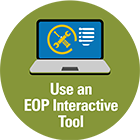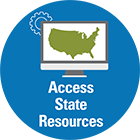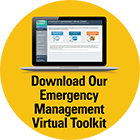Preventing Drug-Related Emergencies: Staying Educated and Prepared for School Safety and Student Health

Ever since the opioid crisis was declared a public health emergency in 2017, entire communities, including their schools, school districts, and institutions of higher education (IHEs), have had to work collaboratively to create comprehensive plans that not only help to prevent against possible opioid overdose and/or other drug-related emergencies but also help to protect the whole school community if one were to occur. These plans are particularly important now as some school and campus communities manage learning, teaching, and student and family engagement models that extend outside of the school building and into the home.
With more students at home, the risk increases. According to the Substance Abuse and Mental Health Services Administration (SAMHSA) and the Partnership to End Addiction, “Two-thirds of teens who misused pain relievers in the past year say that they got them from family and friends, including their home’s medicine cabinets.” The prevalence of prescription drugs in the home and in the communities, the places in which students learn, play, and work, introduces a range of short- and long-term health consequences that can threaten the whole school and campus community. The risk increases more when this prevalence is combined with the misconception that prescription drugs are safer or less harmful than other drugs and their subsequent misuse across settings, including the learning environment.
Opioid use, even experimentation, may lead to issues with drug dependence, addiction, and even the potential for overdose by students, teachers/faculty, staff, administrators, family members, or roommates of students. These risks can evolve into additional challenges that are faced collectively by both the community and the school — higher ed and K-12 alike. These challenges can result in increased property crimes; fighting; vandalism; and the presence of weapons, other drugs or alcohol, or discarded drug paraphernalia. In addition to increasing the risk of other potential threats and, therefore, the overall safety of the learning environment, it can affect students’ perception of safety.
Data show that those struggling with substance use disorders have greatly suffered from the disruption in daily life patterns and the shift in working and learning environments due to the coronavirus disease 2019 (COVID-19) pandemic. The Centers for Disease Control and Prevention shared that in the 12-month period from May 2019 to May 2020 the United States experienced the highest number of overdose deaths ever recorded. Due to the increased potential for loss of life, it is crucial that IHEs and schools collaborate with their community partners (e.g., emergency medical services agencies, law enforcement) to develop high-quality emergency operations plans (EOPs) with processes in place that not only address prevention but also help prepare everyone in the event of possible drug-related overdose.
Planning for opioid- and drug-related emergencies requires a whole community approach featuring collaboration with community partners and support from families. One way that schools and IHEs can strengthen their comprehensive planning efforts is by partnering with their local law enforcement, emergency medical services, fire department, public health department, or another community-based organization. The collaboration can include information awareness activities for families and community members. Take action as a whole school community by participating in opioid overdose prevention and other drug-related prevention activities, such as the National Take Back Day campaign. Together with your community partners, your team can spread awareness of strategies that can be extended to an individual in his or her immediate environment, whether that be at home, at school, or on campus.
Take Collaboration Actions: Participate in National Take Back Day With Us and Your Community Partners
It takes a whole community to prepare for and prevent drug-related emergencies and opioid overdoses, and so collaboration with key community partners on this critical topic is paramount. Practice drug-related emergency prevention strategies, and ensure that they are coordinated with your local community, by joining us in celebrating the 20th National Take Back Day with your community partners. Get involved by participating in this year’s National Prescription Drug Take Back Day event on Saturday, April 24, 2021, between 10:00 a.m. and 2:00 p.m. The U.S. Drug Enforcement Administration (DEA) established the National Prescription Drug Take Back Day to create a prevention initiative that promotes safe, convenient, and responsible methods of disposal for prescription drugs. Additionally, the day is used to inform and educate the general public about the potential misuse and abuse of prescription medications. In 2020 alone, the total weight of prescription drugs and other related materials collected on National Take Back Day was 985,392 lbs. That’s 492.7 tons!
The REMS TA Center encourages you to use the resources below to enhance your whole school community’s participation and knowledge around opioid overdose prevention, while continuing to support your overall safety, security, emergency management, and preparedness (safety) plans.
- Share information about how to safely dispose of unused medications with the whole school community, including students, staff, families, and visitors. Check out this Drug Disposal Guide prepared by the DEA for guidance on appropriately disposing of prescribed medications safely and responsibly in accordance with your local laws and regulations. Incorporate these opioid abuse/misuse prevention strategies and appropriate disposal tactics into health education and behavioral health programs that can be applied both at school and within the home.
- Locate year-round pharmaceutical disposal locations, and consider how to integrate disposal efforts into school safety campaigns. Search the Controlled Substance Public Disposal Locations database to identify DEA authorized locations that provide year-round, drop-off services for the public to dispose of unwanted or unused pharmaceuticals near you. Encourage students, families, and households to dispose of unused prescription medications that may otherwise be misplaced or misused.
- Spread awareness by downloading and incorporating materials for National Take Back Day into your school safety outreach activities. Post and share a variety of resources including pamphlets, posters, handouts, and social media banners to promote awareness and participation in National Take Back Day throughout your school and community. This toolbox provides downloadable materials in both the English and the Spanish languages. Broadcasting these educational materials will help foster a positive school climate that discourages the use of illicit drugs and where students, staff, teachers, and faculty are comfortable seeking treatment and support options for themselves and others.
- Work with community partners to determine the best way to share information on specific drugs with students, faculty, staff, and others who have a role or responsibility in school/higher ed safety. Build your knowledge base on both illegal and legal drugs using the drug database available on the DEA’s Get Smart About Drugs Website. Being educated on a variety of common and uncommon drugs and how they are used will help you prepare and create your school safety plans more confidently and efficiently. Stay informed on the five different classifications or schedules that drugs fall under depending on their intended medical use and potential to elicit a drug dependency.
Utilize Resources From Federal Partners
As your National School Safety Center, the REMS TA Center is dedicated to helping you with safety programs and plans that ultimately support and protect your school environment. These resources are brought to you by Federal partners, the REMS TA Center, and our collaborative work together designed to assist school and campus leaders and planning teams prepare for emergency events related to the opioid crisis and other drug-related emergencies.
Preparing for Opioid-Related Emergencies for K-12 Schools and Institutions of Higher Education Fact Sheet, REMS TA Center. Offers informative outlines, statistics, and resources on opioid-related planning and preparedness activities for both K-12 and higher ed communities.
Opioids, Drug-Related Emergencies, and Substance Abuse Prevention Before, During, and After the COVID-19 Pandemic Webinar, REMS TA Center, U.S. Department of Education, and University of Georgia. Provides an overview of opioids, drug-related emergencies, and substance abuse prevention, as well as highlights planning strategies for school safety that are applicable in all settings and all times.
Combating the Opioid Crisis and Other Substance Misuse: Schools, Students, Families Web page, U.S. Department of Education. Defines opioids and helps inform students, families, and educators about drug misuse and addiction, while outlining the roles schools are responsible for in preventing and reducing opioid misuse.
Evidence-Based Practices Resource Center, U.S. Department of Health and Human Services (HHS), SAMHSA. Offers a variety of evidence-based practices and tools designed to support schools and school districts, with their community partners, as they develop comprehensive plans involved in the prevention, treatment, and recovery support services for substance abuse.
Talk. They Hear You. Student Assistance — A Guide for School Administrators, HHS, SAMHSA. Supports schools and school districts by highlighting foundational information for student assistance services related to mental health and substance abuse.
Webinar Series
- The Opioid Crisis and K-12 Schools: Impact and Response, U.S. Department of Education, Office of Elementary and Secondary Education, Office of Safe and Supportive Schools. Contains details on the opioid crisis and how to engage in best practices and policies to address the rising crisis and mitigate effects for students, families, and schools.
- The Opioid Crisis and K-12 Schools: Supporting Students at School, U.S. Department of Education, Office of Elementary and Secondary Education, Office of Safe and Supportive Schools. Covers impacts experienced by schools and students because of the opioid crisis. The Webinar provides important insights and strategies at the Federal, state, and school levels for supporting students who have been impacted by the crisis.
- Supporting Recovery and Building Resilience on Campus: The Role of Collegiate Recovery Programs, U.S. Department of Education, Office of Elementary and Secondary Education, Office of Safe and Supportive Schools. Addresses methods and programs that provide support for students recovering from opioid, alcohol, stimulants, and other drug or substance abuse challenges at the collegiate level.
Growing Up Drug Free: A Parent’s Guide to Prevention — English Version, DEA and U.S. Department of Education. Provides tips and suggestions for parents and caregivers on raising drug-free children, as well as addressing children who may be suspected of using alcohol, tobacco, or other drugs. This guide is also available in Spanish.
Campus Drug Prevention Web page, DEA. Provides resources on drug misuse prevention that promote creating a healthy and safe environment for IHEs and their surrounding communities.
Get Smart About Drugs Web page, DEA. Highlights current trending topics, news headlines, statistics, informative resources, and consequences related to drugs.
Operation Prevention Web page, DEA and Discovery Education. Contains free online tools and resources for raising awareness around the prevention and dangers of drug abuse for students, educators, families, and professionals.
Participate on Social Media
Follow @remstacenter on Twitter to stay informed and share your activities and promote National Take Back Day using #TakeBackDay. Also follow our Federal partner @DEAHQ as well as #DEACampus to access additional information and resources.
|











